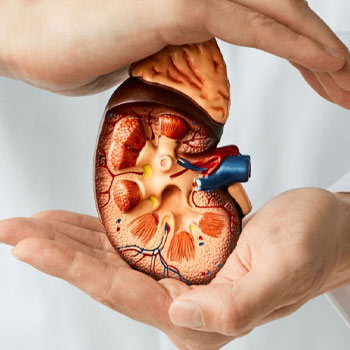What is Nephrology?
Nephrology is a specialized field of medicine that focuses on the diagnosis, treatment, and management of kidney diseases. The kidneys are vital organs responsible for filtering waste products, excess fluids, and toxins from the blood, regulating electrolyte balance, and maintaining overall body homeostasis. Nephrology encompasses a wide range of conditions and diseases that affect the kidneys, from acute kidney injuries to chronic kidney disease (CKD), hypertension, and electrolyte imbalances
What is the role of Nephrologists?
Nephrologists are medical doctors who specialize in nephrology. They have extensive training in internal medicine and additional specialized training in kidney diseases. Nephrologists are responsible for
- Diagnosis: Identifying kidney-related issues through various diagnostic tools such as blood tests, urine tests, imaging studies (ultrasound, CT scans), and kidney biopsies
- Treatment: Managing and treating kidney diseases using medications, dietary changes, lifestyle modifications, and in severe cases, dialysis or kidney transplantation
- Monitoring: Regularly monitoring patients with kidney diseases to manage their conditions and prevent complications
- Prevention: Educating patients about lifestyle choices and preventive measures to avoid kidney diseases
Common Kidney Diseases and Conditions
Chronic Kidney Disease (CKD)
A progressive condition where the kidneys lose their function over time. It can lead to end-stage renal disease (ESRD), requiring dialysis or a kidney transplant. Common causes of CKD include diabetes, hypertension, and glomerulonephritis.
Acute Kidney Injury (AKI)
A sudden loss of kidney function, often reversible with prompt treatment. AKI can result from severe infections, dehydration, medication toxicity, or injury.
Glomerulonephritis
An inflammation of the glomeruli, the tiny filtering units within the kidney. This can lead to proteinuria (protein in the urine), hematuria (blood in the urine), and kidney damage.
Nephrotic Syndrome
A condition characterized by high levels of protein in the urine, low levels of protein in the blood, swelling (edema), and high cholesterol. It can result from various kidney diseases.
Polycystic Kidney Disease (PKD)
A genetic disorder causing numerous cysts to form in the kidneys, leading to enlarged kidneys and impaired function
Hypertension (High Blood Pressure)
Poorly controlled hypertension can damage the kidneys over time, leading to hypertensive nephropathy
Kidney Stones
Hard mineral deposits that form in the kidneys and can cause severe pain and urinary tract obstructions
Diagnostic Tools in Nephrology
Nephrologists use a variety of diagnostic tools to assess kidney function and diagnose kidney diseases
Blood Tests
Measuring levels of creatinine and blood urea nitrogen (BUN) to evaluate kidney function. The glomerular filtration rate (GFR) is calculated based on these levels
Urine Tests
Analyzing urine for protein, blood, glucose, and other substances to detect abnormalities
Imaging Studies
Ultrasound, CT scans, and MRI to visualize the kidneys and detect structural abnormalities
Kidney Biopsy
A procedure where a small sample of kidney tissue is taken for microscopic examination to diagnose specific kidney diseases
Treatment Approaches in Nephrology
Medications
Nephrologists prescribe various medications to manage kidney diseases, including antihypertensives, diuretics, immunosuppressants, and medications to control blood sugar levels in diabetic patients
Dialysis
A life-saving treatment for patients with ESRD, where a machine filters waste products and excess fluids from the blood. There are two main types of dialysis
- Hemodialysis: Blood is filtered outside the body through a dialyzer machine.
- Peritoneal Dialysis: The lining of the abdomen (peritoneum) acts as a natural filter, with a special fluid introduced into the abdominal cavity to absorb waste products
Kidney Transplantation
Surgical placement of a healthy kidney from a donor into a patient with ESRD. It offers a better quality of life and improved survival compared to long-term dialysis
Diet and Lifestyle Changes
Nephrologists often recommend dietary modifications to manage kidney diseases, such as reducing sodium, potassium, and phosphorus intake. Regular exercise, smoking cessation, and maintaining a healthy weight are also important
Preventive Measures for Kidney Health
- Hydration: Drinking adequate water helps the kidneys function properly and prevents kidney stones
- Healthy Diet: Consuming a balanced diet low in sodium and rich in fruits, vegetables, and whole grains supports kidney health
- Regular Check-ups: Routine medical check-ups can detect early signs of kidney disease, especially in individuals with risk factors like diabetes and hypertension
- Blood Pressure and Blood Sugar Control: Keeping blood pressure and blood sugar levels within normal ranges reduces the risk of kidney damage
- Avoiding Overuse of Medications: Limiting the use of non-prescription medications like NSAIDs, which can harm the kidneys with prolonged use
Future of Nephrology
Advancements in medical research and technology continue to improve the understanding and treatment of kidney diseases. Innovations in artificial intelligence, genetic research, and personalized medicine are paving the way for more precise and effective nephrology care. The development of new medications and therapies holds promise for better management and potential cures for kidney diseases.
Nephrology is a crucial field of medicine dedicated to maintaining and restoring kidney health. Nephrologists play a vital role in diagnosing, treating, and preventing kidney diseases, ensuring patients lead healthier and longer lives. Understanding nephrology and the importance of kidney health can empower individuals to take proactive steps in maintaining their overall well-being.

